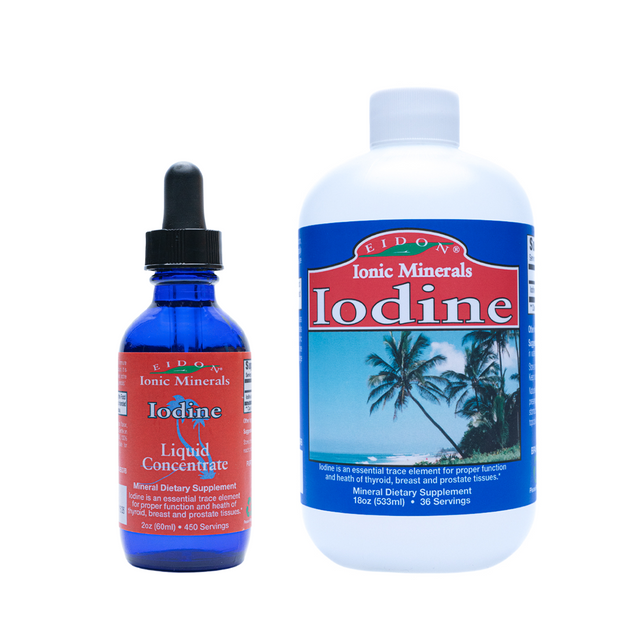
Iodine has been in and out of favor as a nutrient ever since it was isolated by a French chemist in 1811. He discovered it in seaweed (kelp) while attempting to make saltpeter to be used in gunpowder. In the early 1900s, iodine was a common recommendation of doctors for a myriad of conditions.
What we currently know is that the availability of Iodine in our soils or water is sporadic at best and non-existent at worst. We also know that Iodine plays important role in the functioning of the organs Thyroid, Prostate, and Breast. In the Thyroid, Iodine has a significant role in the production of the hormones T3 and T4. These hormones are essential to produce energy in every cell in our body. While the role of iodine in the prostate and in breast tissue is not as well defined, what has been measured is the levels of iodine in healthy vs. unhealthy (poorly functioning) breast and prostate tissue. Poorly functioning breast and prostate organs are virtually devoid of iodine whereas healthy tissues reflect good levels of iodine. Logically, then, it is important to make sure you get adequate dietary iodine to make sure these organs can perform their physiological roles.
Here is the problem ...
It appears the body uses iodine, along with selenium and zinc, to help remove mercury and lead from our tissues and blood. In our society, the presence of these 2 toxic elements is, relatively speaking, significant. So, even though we may be getting what would be considered adequate dietary levels of iodine, selenium, and zinc, the body must direct them to the role of detoxification first and foremost, before deposition into the thyroid, prostate, and breast organs so that these organs can function properly. Most people today simply don't get enough of these 3 elements daily to adequately sustain the normal functioning of these organs, let alone deal with any heavy metals.
It is my belief that the most widespread and dangerous heavy metal we are exposed to is mercury. While we may get some from the bigger seafood caught today, the most widespread and frequent sources of mercury are from vaccines and dental mercury/silver amalgam fillings. Amalgams can leak and the give body a steady source of mercury 24/7. If you have even one amalgam, virtually all of your iodine, selenium, and zinc are being used in order to remove the mercury.
Another element that is antagonistic to iodine is fluoride. Unfortunately, fluoride is replete in our toothpaste and is now added to many municipal water supplies to be consumed on a daily basis whenever we drink, cook or wash with our tap water.
With all the potential ways of acquiring toxic elements, it is imperative to get extra amounts of the elements our body can use to remove them. Iodine is essential, but also very important are selenium and zinc.
Eidon manufactures all of these essential elements in a highly bioavailable water-based format which the body can quickly absorb and utilize.
Give them a try!
In good health,
Rick Wagner, M.S.,C.N.









